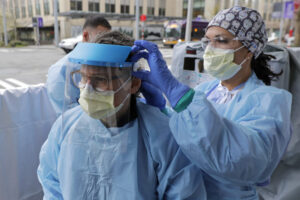
As the two-year recurrence of the deadly COVID-19 surge approaches and a recently FDA approved vaccine that many people are still questioning, COVID-19 continues to overload hospitals at a disturbing rate, causing hospitalization rates to rise locally and nationally.
Florida, the third most populated state, has become one of the hot spots for the virus, and accounts for about one in five new infections in the United States. This past weekend the state Department of Health reported about 100,000 new coronavirus cases amongst Florida residents.
Dr. Trey Blake, Chief Medical Officer at HCA Healthcare and Capital Regional Medical Center in Tallahassee says that COVID cases are indeed rising .
“We have seen more covid patients in our hospital with this surge than we did when it first started… but our focus continues to remain on the health and safety of our patients and colleagues during this most recent COVID-19 surge,” Blake said.
Covid is not only affecting the patients but it’s also putting a strain on the nurses, doctors and staff members.
Macartie Louis, a nurse who works in the intensive care unit, says that they are doing all that they can amid a spike in cases.
“When I come to work everyday, it’s draining,” said Louis.
In Florida, this week’s 2,448 deaths shows that there is an increase from the 2,345 reported last week. Though deaths can take several days or weeks to be documented, many doctors, nurses, and staff across the state are seeing a fast paced crisis with no end in sight.
“The first wave was already bad in itself but now it seems to be even worse. We are running out of space to put patients in and I’m ready to go back to just taking care of just two or three people,” Louis added about the shifting hospital dynamics.
Blake, the CMO at Capital Regional, believes that the vaccine is the safest and most effective tool to end the pandemic and there are many ways our community can prevent the spread by educating others on the vaccine.
“The stress is getting to everyone. However, it is important that our community remains vigilant in infection prevention practices and also consider becoming vaccinated against the COVID-19 virus.”
Louis also believes that the vaccines are safe and healthy and that everyone should get it, if their health allows.
The Centers for Disease Control and Prevention research shows that the COVID-19 vaccination is effective and decreases the risk of COVID-19. Vaccine effectiveness studies show that mRNA, Pfizer and Moderna are more effective due to being available longer.
CDC and experts are persistent on evaluating other vaccines, it’s effectiveness, and how COVID-19 vaccines are operating in the real-world atmosphere.
Government and local officials are urging the public to take mask mandates and social distancing in public areas seriously, but many are saying it’s a matter of personal choice.
Erica Marcum, a sophomore at Florida State University, says that she was a bit hesitant about attending in-person classes, especially amongst unvaccinated students on campus.
“They should require students, staff and faculty to wear face masks on campus since the delta variant is affecting people who are vaccinated as well. I’ll still be wearing a face mask on campus even if others aren’t,” said Marcum.
Marcum also expressed her worries of living with other individuals amid the ongoing pandemic.
“Living with three other people definitely plays a factor and it puts me at risk because I don’t know where, or who, my roommates are interacting with… ,” Marcum said.
Marcum voluntarily chose to take the Pfizer vaccine to protect herself and others from the deadly virus, following her physician’s advice, and encouraged her friends to get vaccinated too.
“We each asked if we should get vaccinated, and we were told we should,” said Marcum.